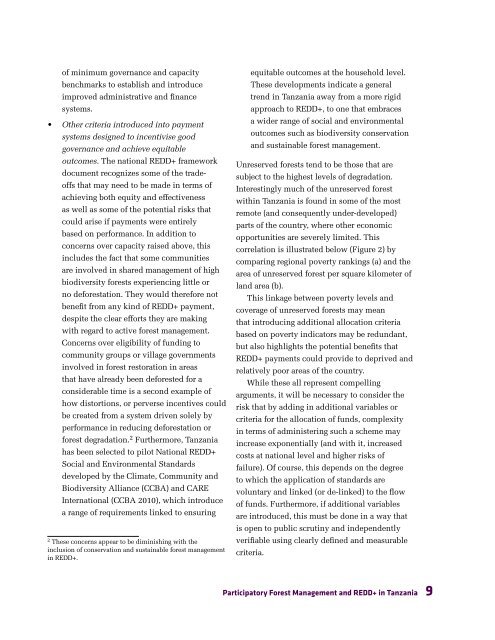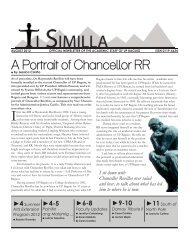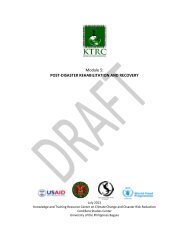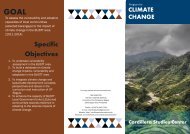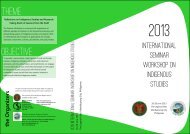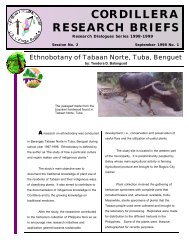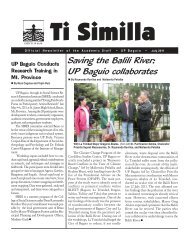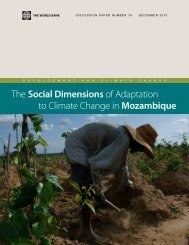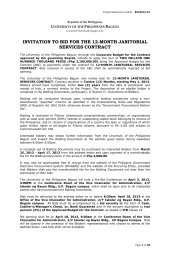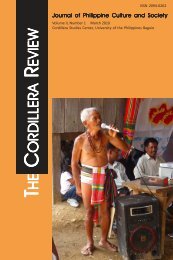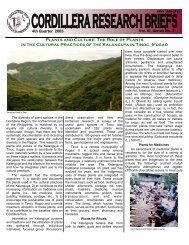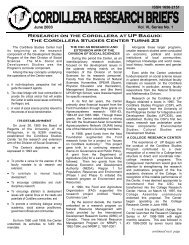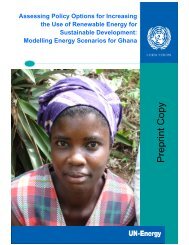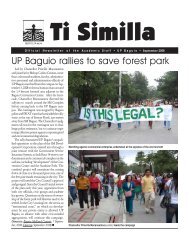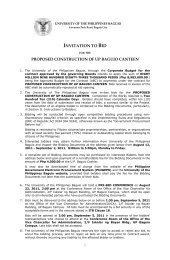Tanzania Report
Tanzania Report
Tanzania Report
Create successful ePaper yourself
Turn your PDF publications into a flip-book with our unique Google optimized e-Paper software.
•<br />
of minimum governance and capacity<br />
benchmarks to establish and introduce<br />
improved administrative and finance<br />
systems.<br />
Othercriteriaintroducedintopayment<br />
systemsdesignedtoincentivisegood<br />
governanceandachieveequitable<br />
outcomes.The national REDD+ framework<br />
document recognizes some of the tradeoffs<br />
that may need to be made in terms of<br />
achieving both equity and effectiveness<br />
as well as some of the potential risks that<br />
could arise if payments were entirely<br />
based on performance. In addition to<br />
concerns over capacity raised above, this<br />
includes the fact that some communities<br />
are involved in shared management of high<br />
biodiversity forests experiencing little or<br />
no deforestation. They would therefore not<br />
benefit from any kind of REDD+ payment,<br />
despite the clear efforts they are making<br />
with regard to active forest management.<br />
Concerns over eligibility of funding to<br />
community groups or village governments<br />
involved in forest restoration in areas<br />
that have already been deforested for a<br />
considerable time is a second example of<br />
how distortions, or perverse incentives could<br />
be created from a system driven solely by<br />
performance in reducing deforestation or<br />
forest degradation. 2 Furthermore, <strong>Tanzania</strong><br />
has been selected to pilot National REDD+<br />
Social and Environmental Standards<br />
developed by the Climate, Community and<br />
Biodiversity Alliance (CCBA) and CARE<br />
International (CCBA 2010), which introduce<br />
a range of requirements linked to ensuring<br />
2 These concerns appear to be diminishing with the<br />
inclusion of conservation and sustainable forest management<br />
in REDD+.<br />
equitable outcomes at the household level.<br />
These developments indicate a general<br />
trend in <strong>Tanzania</strong> away from a more rigid<br />
approach to REDD+, to one that embraces<br />
a wider range of social and environmental<br />
outcomes such as biodiversity conservation<br />
and sustainable forest management.<br />
Unreserved forests tend to be those that are<br />
subject to the highest levels of degradation.<br />
Interestingly much of the unreserved forest<br />
within <strong>Tanzania</strong> is found in some of the most<br />
remote (and consequently under-developed)<br />
parts of the country, where other economic<br />
opportunities are severely limited. This<br />
correlation is illustrated below (Figure 2) by<br />
comparing regional poverty rankings (a) and the<br />
area of unreserved forest per square kilometer of<br />
land area (b).<br />
This linkage between poverty levels and<br />
coverage of unreserved forests may mean<br />
that introducing additional allocation criteria<br />
based on poverty indicators may be redundant,<br />
but also highlights the potential benefits that<br />
REDD+ payments could provide to deprived and<br />
relatively poor areas of the country.<br />
While these all represent compelling<br />
arguments, it will be necessary to consider the<br />
risk that by adding in additional variables or<br />
criteria for the allocation of funds, complexity<br />
in terms of administering such a scheme may<br />
increase exponentially (and with it, increased<br />
costs at national level and higher risks of<br />
failure). Of course, this depends on the degree<br />
to which the application of standards are<br />
voluntary and linked (or de-linked) to the flow<br />
of funds. Furthermore, if additional variables<br />
are introduced, this must be done in a way that<br />
is open to public scrutiny and independently<br />
verifiable using clearly defined and measurable<br />
criteria.<br />
Participatory Forest Management and REDD+ in <strong>Tanzania</strong><br />
9


